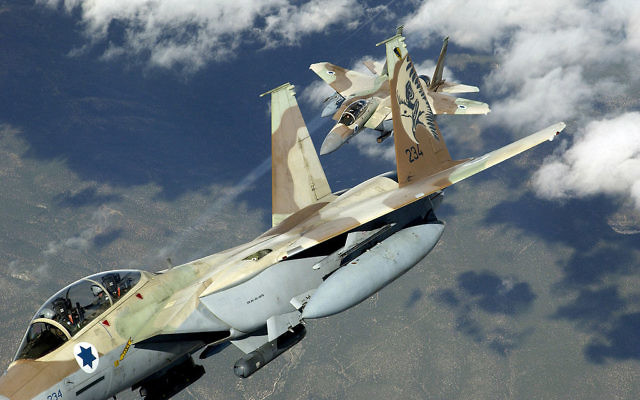Israeli planes strike in Syria
The IDF carries out a number of targeted strikes and intercepts missiles launched at its aircraft from the ground
Syria fired three surface-to-air missiles at Israeli jets on Thursday night as the fighter planes flew over Syrian airspace.
The incident, which saw a rare Syrian state response, occurred as Israeli jets hit a range of targets to in its northern neighbour, including a Hezbollah-bound convoy, similar to sorties they have undertaken several times in recent years.
The three Russian-made SA-5 anti-aircraft missiles are understood to have failed to hit their target, despite the Syrian army saying it shot down one of the jets. There is no evidence that it did, but the incident did trigger warning sirens in Israel.
The Times of Israel reports that the Syrian missiles were intercepted by an Israeli Air Force Arrow missile battery, which are designed to thwart incoming ballistic missiles aimed at targets on land, rather than targets in the air.
The timing of the incident was apt, as analysts in London recalled the circumstances leading up to the Six-Day War in 1967 almost 50 years ago, when Israeli forces inflicted a devastating defeat on three Arab neighbours – including Syria.
Speaking at a BICOM-RUSI conference, experts and academics said the conflict began with Soviet intelligence delivered to Col. Nasser in Cairo, warning that Israel was about to attack Syria.
On 13 May 1967, the Soviets told Nasser that the Israelis were about to attack Syria, in 4-5 days’ time. That night, Nasser met his army chief at his villa and they made a decision to strike.
Analysing the consequences was a panel was chaired by Greg Shapland, Associate Fellow at Chatham House, who previously worked on the Middle East desk at the Foreign & Commonwealth Office, and comprising Dr Arhan Bregman from King’s College, London and Guy Laron from Hebrew University in Jerusalem.
Laron asked: “Why would Israel want to attack Syria? Why should it concern Egypt? And how were the Soviets involved?” The context was an “Arab cold war,” he said, with states distrustful of one another. Syria’s instability – having had 17 military coups in 22 years – was another factor. But it was partially accidental that the three states ended up at war with Israel.
“None of them wanted to confront Israel on the battlefield, because it was seen as being militarily formidable, nevertheless to score points with the Arab public, Arab leaders kept egging each other on,” said Laron.

Thank you for helping to make Jewish News the leading source of news and opinion for the UK Jewish community. Today we're asking for your invaluable help to continue putting our community first in everything we do.
For as little as £5 a month you can help sustain the vital work we do in celebrating and standing up for Jewish life in Britain.
Jewish News holds our community together and keeps us connected. Like a synagogue, it’s where people turn to feel part of something bigger. It also proudly shows the rest of Britain the vibrancy and rich culture of modern Jewish life.
You can make a quick and easy one-off or monthly contribution of £5, £10, £20 or any other sum you’re comfortable with.
100% of your donation will help us continue celebrating our community, in all its dynamic diversity...
Engaging
Being a community platform means so much more than producing a newspaper and website. One of our proudest roles is media partnering with our invaluable charities to amplify the outstanding work they do to help us all.
Celebrating
There’s no shortage of oys in the world but Jewish News takes every opportunity to celebrate the joys too, through projects like Night of Heroes, 40 Under 40 and other compelling countdowns that make the community kvell with pride.
Pioneering
In the first collaboration between media outlets from different faiths, Jewish News worked with British Muslim TV and Church Times to produce a list of young activists leading the way on interfaith understanding.
Campaigning
Royal Mail issued a stamp honouring Holocaust hero Sir Nicholas Winton after a Jewish News campaign attracted more than 100,000 backers. Jewish Newsalso produces special editions of the paper highlighting pressing issues including mental health and Holocaust remembrance.
Easy access
In an age when news is readily accessible, Jewish News provides high-quality content free online and offline, removing any financial barriers to connecting people.
Voice of our community to wider society
The Jewish News team regularly appears on TV, radio and on the pages of the national press to comment on stories about the Jewish community. Easy access to the paper on the streets of London also means Jewish News provides an invaluable window into the community for the country at large.
We hope you agree all this is worth preserving.






















